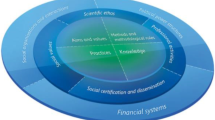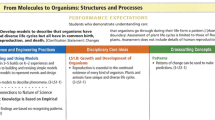Abstract
There has been a longstanding interest in the kinds of scientific knowledge that primary science learners must know and be able to do, which comprise the intellectual demands in this subject. These prescriptions chiefly take guidance from national curriculum documents, especially in the form of their learning outcomes (LO) or learning standards. Using the concepts of semantic density (SD) and semantic gravity (SG), we formulate a novel coding scheme for primary science LO based on Semantics and Legitimation Code Theory. We demonstrate how SD and SG provide insights into the levels of complexity and abstraction respectively from a mix of qualitative and quantitative criteria that we devised. We empirically test the utility of this coding scheme by comparing present reformed primary science LO with their previous versions across three East-Asian regions. It was shown that their LO were not significantly different over versions in terms of SD/SG, had typically one to two learning points, favoured more context-dependent expressions, and were predominantly coded as SD-SG+. This research provides a complementary method of determining the intellectual demands of science curricula in terms of complexity and abstraction of LO that has implications for science teaching as well as the improvement of epistemological access for learners.

Similar content being viewed by others
References
Anderson, L. W., Krathwohl, D. R., Airasian, P. W., Cruikshank, K. A., Mayer, R. E., Pintrich … Wittrock, M. C. (Eds.). (2001). A taxonomy for learning, teaching and assessing. A revision of Bloom's taxonomy of educational objectives. White Plains: Addison-Wesley Longman.
Blackie, A. L. M. (2014). Creating semantic waves: using Legitimation Code Theory as a tool to aid the teaching of chemistry. Chemistry Education Research and Practice, 15(4), 462–469. https://doi.org/10.1039/C4RP00147H.
Borghi, A. M., Binkofski, F., Castelfranchi, C., Cimatti, F., Scorolli, C., & Tummolini, L. (2017). The challenge of abstract concepts. Psychological Bulletin, 143(3), 263–292. https://doi.org/10.1037/bul0000089.
Buxton, C., Harman, R., Cardozo-Gaibisso, L., Jiang, L., Bui, K., & Allexsaht-Snider, M. (2019). Understanding science and language connections: new approaches to assessment with bilingual learners. Research in Science Education, 49, 977–988. https://doi.org/10.1007/s11165-019-9846-8.
Doran, Y. J. (2017). The role of mathematics in physics: building knowledge and describing the empirical world. Onomázein Número Especial, SFL, 209–226. https://doi.org/10.7764/onomazein.sfl.08.
Garraway, J., & Bozalek, V. (2019). Reconfiguring foundational pedagogies through theoretical frameworks. Alternation: Interdisciplinary Journal for the Study of the Arts and Humanities in Southern Africa, 26(2).
Georgiou, H. (2016). Putting physics knowledge in the hot seat: the semantics of student understandings of thermodynamics. In K. Maton, S. Hood, & S. Shay (Eds.), Knowledge-building: educational studies in Legitimation Code Theory (pp. 176–192). Abingdon: Routledge.
Georgiou, H., Maton, K., & Sharma, M. (2014). Recovering knowledge for science education research: exploring the “Icarus Effect” in student work. Canadian Journal of Science, Mathematics, and Technology Education, 14(3), 252–268. https://doi.org/10.1080/14926156.2014.935526.
Granito, C., Scorolli, C., & Borghi, A. M. (2015). Naming a LEGO world: the world of language in the acquisition of abstract concepts. PLoS One, 10, e0114615. https://doi.org/10.1371/journal.pone.0114615.
Hayes, J. C., & Kraemer, D. J. M. (2017). Grounded understanding of abstract concepts: the case of STEM learning. Cognitive Research: Principles and Implications, 2. https://doi.org/10.1186/s41235-016-0046-z.
Karplus, R. (1977). Science teaching and the development of reasoning. Journal of Research in Science Teaching, 14, 169–175.
Kelly-Laubscher, R., & Luckett, K. (2016). Differences in curriculum structure between high school and university biology: the implications for epistemological access. Journal of Biological Education, 50(4), 425–441. https://doi.org/10.1080/00219266.2016.1138991.
Kelter, S., & Kaup, B. (2019). Conceptual knowledge, categorization and meaning. In I. K. von Heusinger, C. Maienborn, & P. Portner (Eds.), Semantics: typology, diachrony and processing (pp. 303–340). Berlin: de Gruyter.
Kinchin, I. M., Möllits, A., & Reiska, P. (2019). Uncovering types of knowledge in concept maps. Education in Science, 9(2), 131. https://doi.org/10.3390/educsci9020131.
Lee, Y.-J., Kim, M., & Yoon, H.-G. (2015). The intellectual demands of the intended primary science curriculum in Korea and Singapore: An analysis based on revised Bloom’s taxonomy. International Journal of Science Education, 37, 2193–2213. https://doi.org/10.1080/09500693.2015.1072290.
Lee, Y.-J., Kim, M., Jin, Q., Yoon, H.-G., & Matsubara, K. (2017). East-Asian primary science curricula: An overview using revised Bloom’s Taxonomy. Dordrecht: Springer.
Lee, Y.-J., & Tan, J. (Eds.) (2018). Primary science education in East Asia: A critical comparison of systems and strategies. Cham, Switzerland: Springer
Luckett, K., & Hunma, A. (2014). Making gazes explicit: facilitating epistemic access in the humanities. Higher Education, 67(2), 183–198. https://doi.org/10.1007/s10734-013-9651-7.
Luke, A. (2010). Will the Australian curriculum up the intellectual ante in primary classrooms? Curriculum Perspectives, 30(3), 59–64.
Maton, K. (2014). Knowledge and knowers: towards a realist sociology of education. London: Routledge.
Maton, K. (2019). Semantic waves from Legitimation Code Theory. Retrieved from http://legitimationcodetheory.com/wordpress/wp-content/uploads/2018/07/2019Maton-Semantics-intro.pdf.
Maton, K. (2020). Semantic waves: context, complexity and academic discourse. In J. R. Martin, K. Maton, & Y. J. Doran (Eds.), Accessing academic discourse: Systemic Functional Linguistics and Legitimation Code Theory (pp. 59-86). Abingdon: Routledge.
Maton, K., Hood, S., & Shay, S. (Eds.). (2016). Knowledge-building: educational studies in Legitimation Code Theory. Abingdon: Routledge.
Mills, R., Bourke, T., & Siostrom, E. (2020). Complexity and contradiction: disciplinary expert teachers in primary science and mathematics education. Teaching and Teacher Education, 89, 103010. https://doi.org/10.1016/j.tate.2019.103010.
Mouton, M., & Archer, E. (2019). Legitimation Code Theory to facilitate transition from high school to first-year biology. Journal of Biological Education, 53(1), 2–30. https://doi.org/10.1080/00219266.2017.1420681.
Rata, E., McPhail, G., & Barrett, B. (2019). An engaging pedagogy for an academic curriculum. The Curriculum Journal, 30, 162–180. https://doi.org/10.1080/09585176.2018.1557535.
Rootman-le Grange, I., & Blackie, M. A. L. (2018). Assessing assessment: in pursuit of meaningful learning. Chemistry Education Research and Practice, 19, 484–490. https://doi.org/10.1039/C7RP00191F.
Shay, S. (2016). Curricula at the boundaries. Higher Education, 71, 767–779. https://doi.org/10.1007/s10734-015-9917-3.
Wang, Y., Lavonen, J., & Kirsi, T. (2019). An assessment of how scientific literacy-related aims are actualised in the National Primary Science curricula in China and Finland. International Journal of Science and Mathematics Education, 41, 1435–1456. https://doi.org/10.1080/09500693.2019.1612120.
Wiemer-Hastings, K., & Xu, X. (2005). Content differences for abstract and concrete concepts. Cognitive Science, 29(5), 719–736. https://doi.org/10.1207/s15516709cog0000_33.
Yates, L., & Collins, C. (2010). The absence of knowledge in Australian curriculum reforms. European Journal of Education, 45(1), 89–102. https://doi.org/10.1111/j.1465-3435.2009.01417.x
Young, M. (2007). Bringing knowledge back in: from social constructivism to social realism in the sociology of education. London: Routledge.
Funding
This research was sponsored by a project of the National Social Science Foundation of China (Education Sector), which is entitled the Construction of the Model of Scientific Literacy for Primary and Secondary School Students within Confucian Culture and its Empirical Study (BHA180145).
Author information
Authors and Affiliations
Corresponding author
Additional information
Publisher’s Note
Springer Nature remains neutral with regard to jurisdictional claims in published maps and institutional affiliations.
Rights and permissions
About this article
Cite this article
Lee, YJ., Wan, D. How Complex or Abstract Are Science Learning Outcomes? A Novel Coding Scheme Based on Semantic Density and Gravity. Res Sci Educ 52, 493–509 (2022). https://doi.org/10.1007/s11165-020-09955-5
Published:
Issue Date:
DOI: https://doi.org/10.1007/s11165-020-09955-5




